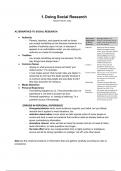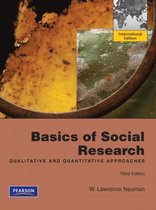1. Doing Social Research
Natalia Pułtorak, 2022
ALTERNATIVES TO SOCIAL RESEARCH:
● Authority
- Parents, teachers, and experts as well as books
- you accept something as true because someone in a
position of authority says it is true, or because it
appears in an authoritative outlet, you are relying on
authority as a basis for knowledge.
● Tradition
- you accept something as being true because “it’s the
way things have always been.”
● Common Sense
- relying on what everyone knows and what “just
makes sense.” For example,
- it “just makes sense” that murder rates are higher in
areas that do not have the death penalty because it
is common sense that people are less likely to kill if
they face execution for doing so.
● Media Distortion
● Personal Experience
- If something happens to us, if we personally see it or
experience it, we tend to accept it as true.
- Personal experience, or “seeing is believing,” is a
powerful source of knowledge.
ERRORS IN PERSONAL EXPERIENCE
- Overgeneralization when some evidence supports your belief, but you falsely
assume that it applies to most situations, too.
- selective observation occurs when we take special notice of some people or
events and tend to seek out evidence that confirms what we already believe and
ignore contradictory information.
- premature closure when we feel we have the answer and do not need to listen,
seek information, or raise questions any longer.
- the halo effect when we overgeneralize from a highly positive or prestigious
source and let its strong reputation or prestige “rub off” onto other areas.
Data are the empirical evidence or information that one gathers carefully according to rules or
procedures.
,Social science data can be
- quantitative (i.e., expressed as numbers)
- qualitative (i.e., expressed as words, visual images, sounds, or objects).
Empirical evidence refers to observations that we experience through the senses—touch,
sight, hearing, smell, and taste.
A scientific community is a collection of people who practice science and a set of norms,
behaviors, and attitudes that bind them together.
The scientific method is not one single thing; it refers to the ideas, rules, techniques, and
approaches that the scientific community uses. The method arises from a loose consensus
within the community of scientists.
DIMENSIONS OF RESEARCH
- Basic research advances fundamental knowledge about the social world.It focuses on
developing, testing, and supporting theories that explain how the social world operates,
why social relations operate as they do, and how society changes.
- Applied research addresses a specific concern or offers solutions to a practical problem
that an employer, club, agency, social movement, or organization identified
,






